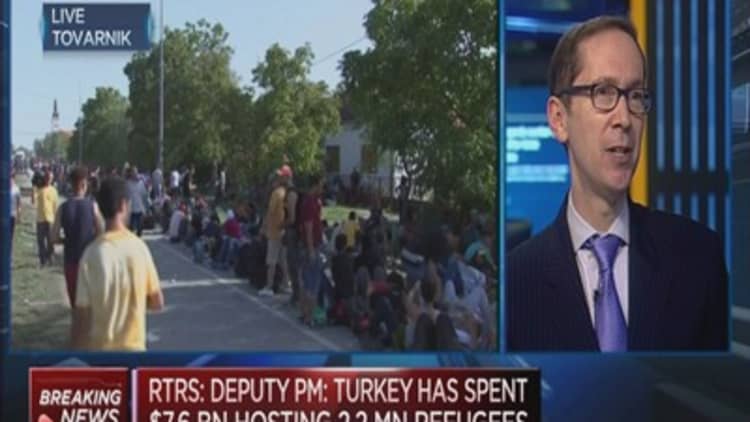As Turkey reports spending $7.6 billion to host 2.2 million refugees, economists and investors debate the likely costs—and benefits—to Europe from the mass influx of people.
With war continuing in Syria and Afghanistan, Iraq and parts of Africa still unstable, the influx of people into Europe and the safer parts of the Middle East has rapidly accelerated this year. More than 300,000 people have arrived in Europe by sea this year, while around 2,500 drowned attempting the journey, according to the Red Cross.
Some analysts believe that in the long-term, countries like Germany with ageing populations stand to gain from an influx of (largely younger) immigrants.
"In principle, fast-aging Europe could well benefit from the arrival of young, often relatively well-educated migrants, but the mixed success of many European countries in integrating migrants highlights that such economic benefits are by no means automatic," said Citi analysts led by Tina Fordham in a report this month.
However, the costs in the short-term are "clearly significant," Daniel Morris, senior investment strategist at BNP Paribas, told CNBC on Friday.
"You can imagine it is just going to get more challenging as we move into Autumn and Winter. I mean right now, at least you have got decent weather for these people, but imagine the situation in December," he said.
Alistair Newton, formerly of Nomura and now director of Alavan Business Advisory, concurred. "At best, we therefore look to be in for a long and difficult haul, which warrants careful attention from investors given what I see as the inherent downside risks," he said in a research note on Friday.

East-West faultlines in EU
Last week, European Commission President Jean-Claude Juncker announced plans to distribute 120,000 additional refugees on a proportional basis across the 28 countries of the European Union. The Commission has also proposed to establish an emergency fund, starting with 1.8 billion euros ($2.1 billion), to address the crises in North and North East Africa.
The costs for government include providing the influx of people with healthcare, education, housing and other social benefits. In the longer-term, migrants could be absorbed into the labor force and eventually boost consumer demand, driving economic growth.
The prospect of each country taking a share of asylum-seekers has proved decisive in Europe, drawing a line between the generally more welcoming western Europe and the post-Communist countries in the east.
Notably, Hungary—an important entry point for those attempting to enter the European Union— has built a fence along its border with Serbia in order to keep out the influx. Refuges and migrants are now taking a new route, through Croatia, whose police force said on Thursday that 5,650 people had entered so far, according to Reuters.
Policy spillover: Russia
Europe's latest crisis has spillovers for an earlier one—the incursion of Russia into neighboring Ukraine and its annexation of Crimea. European leaders' hopes for a joint strategy with Russia vis-à-vis Syria could weigh on their decision regarding renewing sanctions against Moscow that are due to expire at the end of January 2016.
Hungarian President Viktor Orban is one of several leaders who may balk at extending sanctions if the European Union's policy on refugees goes in a direction of which he disapproves.
"Any failure by the EU to extend sanctions in the absence of significant and concrete progress (i.e. beyond the current ceasefire in Ukraine) would risk a transatlantic rift," said Newton.
This "would suit Mr. Putin very well, I believe - and encourage the 'hawks' in Washington, especially in an election year, to press for even tougher (unilateral) U.S. sanctions, as well as causing some there to question yet more robustly the extent to which America should continue militarily to protect Europeans who were not prepared to stand up for themselves."
—By CNBC's Katy Barnato. Follower on Twitter @KatyBarnato.


